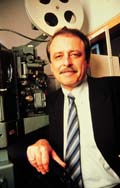DNA On/Off Switch Discovered
 The breakthrough discovery of a new human enzyme by scientists at McGill may eventually play a role in the cure for cancer, advances in organ transplants and cloning. Associate Professor of Pharmacology Moshe Szyf led a team of McGill researchers in the hunt for the enzyme, called demethylase, that controls how cells operate. The breakthrough discovery of a new human enzyme by scientists at McGill may eventually play a role in the cure for cancer, advances in organ transplants and cloning. Associate Professor of Pharmacology Moshe Szyf led a team of McGill researchers in the hunt for the enzyme, called demethylase, that controls how cells operate.
Cells are the smallest unit of living organisms and each one carries the genetic information (or DNA) required to build a complete organism. As different cells develop, they turn different parts of this genetic information on or off, depending on the cell's function in the organism as a whole.
"Obviously, one of the greatest and most important secrets of biology is how this is achieved," said Dr. Szyf in announcing the discovery, at the same time as the research was published in the British journal Nature. "What locks a cell in a specific program? Part of this process is controlled by enzymes that modify the DNA. To utilize the full potential of biotechnology one has to be able to unlock these genetic programs."
Szyf has been working on this genetic mystery for 15 years, although there were some who believed he was on a wild goose chase. He was denied funding in 1993 by the Medical Research Council because existing medical knowledge suggested the substance he was looking for simply did not exist. Now he and his team have proved the demethylase enzyme is in fact very real.
The researchers believe that understanding the new gene will allow them to control and reverse genetic programs: to change what cells do. The potential in anti-cancer therapy is significant, since the use of such enzymes could inhibit and reverse cancer growth. In the researchers' preliminary experiments on lung cancer tissue, they were able to do just that.
As promising as this news is, there's still a lot of work to be done and Szyf and his team are anxious to move to the next stage. "As soon as we have funding," said Szyf, "we'd like to do an animal experiment, because that's critical: to show it in a full animal. In my experience, whenever an experiment works like this in a tissue culture, it always works in the animal. And then of course the next step would be to try it with humans."
The research also has enormous potential for organ transplantation since it could allow scientists to match organs to an individual's genetics without the complications of rejected organs. Cloning, too, could become more advanced, since cloned cells could be modified to behave in any way (instead of being limited to the function of the original cell) now that the "on/off" switch has been found.
Dean of Medicine Abraham Fuks praised the scientists, comparing their work to early research on tissue cultures that led to the polio vaccine. Dr. Szyf's McGill research team included Dr. Sanjoy Bhattacharya, a postdoctoral fellow, and doctoral candidates Shyam Ramchandani and Nadia Cervoni.
|
Play it Again, Friday
 If you were marooned on a desert island and could take a CD player and only 20 CDs, which ones would you choose? Leaping past the logic -- who plans a shipwreck? -- this is the kind of thing that is asked a lot about books, people, food, etc. If you were marooned on a desert island and could take a CD player and only 20 CDs, which ones would you choose? Leaping past the logic -- who plans a shipwreck? -- this is the kind of thing that is asked a lot about books, people, food, etc.
Someone who answered the musical question is Jack Bowers, a writer for Jazz Now magazine, and the notable thing about Bowers's choice of must-have big band CDs is that it includes one by the McGill Jazz Ensemble. Something Personal (NuJazz 003), produced in part with support from McGill's Alma Mater Fund, is an eclectic mix, including compositions by Thelonius Monk, Jerome Kern and Claude Debussy. Ranking Something Personal no. 15 on his list, Bowers, who made his picks from 625 possibilities, has high praise for the CD's student musicians under the direction of Gordon Foote:
"A college band? Yes -- and from Canada, too. Although composed entirely of students, the ensemble plays as well as any working play-for-pay band we've heard recently. If there's a difference I can't perceive it. The same is true of soloists, who are remarkably well-schooled and resourceful. It would be an unbounded pleasure to carry this one to the island."
|
She Saves Seahorses by the Seashore

McGill professor Amanda Vincent has joined a rare group. The conservation biologist is one of only 40 people worldwide who since 1976 have been named recipients of the Rolex Award for Enterprise and is the first Canadian to have earned the distinction. Rolex Award winners, selected by an international jury of high achievers in a variety of disciplines, must submit projects that meet such imposing criteria as "contributing to the betterment of humankind and improving the quality of life on the planet."
Professor Vincent is the world's leading expert on seahorses (see McGill News, Summer'97). Intrigued by their unusual reproductive methods (the male gets pregnant, carries the young in his half-teaspoon-size pouch, and gives birth), she began studying the creatures as a doctoral student at Cambridge. It wasn't long, she says, before she became "absolutely besotted" by the little fish, and discovered that they were threatened by habitat destruction and overfishing. Long thought to have curative powers, seahorses are in huge demand for use in Chinese traditional medicine, but also to produce curios like key chains and earrings.
Recognizing that seahorses provided a livelihood for many subsistence fishers, Vincent knew that a successful conservation program would have to save the fish but also preserve the incomes on which so many people depended. Working with a group of villagers and local biologists in the Philippines, Vincent established a community-based conservation project in 1995 which persuaded fishers to change their methods and establish no-catch zones. Since then, the people have learned to manage the seahorses so that their numbers have stabilized, and also to explore alternative income sources to further reduce pressure on the seahorse population. It was this project, which also encourages research, provides apprenticeships and scholarships for high-school-age children in the village and is designed to be self-sustaining, that earned the $50,000 Rolex Award. "The timing of the Rolex Award couldn't be better," says Vincent. Funding for the Philippines project was due to run out shortly after her prize was announced.
Having made a difference on the supply side, Vincent is already tackling demand. She has begun discussions with some of the biggest importers in China, hoping to persuade them to substitute a less fragile resource in traditional prescriptions.
|
McGill Reaches New Heights
 Rising behind McGill alumni Lisa Vitols, BA'92, and Marty Bergmann, BSc'79, is McGill Mountain, which, the pair tells us, was named years ago for some other graduates who were in the area conducting research. But don't dust off your hiking boots just yet, getting there to pose in its shadow is quite an undertaking. As the absence of trees might suggest, this spot is pretty far north. In fact, it's on Ellesmere Island near Lake Hazen, a chunk of northern territory soon to become part of Nunavut. Rising behind McGill alumni Lisa Vitols, BA'92, and Marty Bergmann, BSc'79, is McGill Mountain, which, the pair tells us, was named years ago for some other graduates who were in the area conducting research. But don't dust off your hiking boots just yet, getting there to pose in its shadow is quite an undertaking. As the absence of trees might suggest, this spot is pretty far north. In fact, it's on Ellesmere Island near Lake Hazen, a chunk of northern territory soon to become part of Nunavut.
Lisa and Marty, both employees of the federal Department of Fisheries and Oceans, were travelling with Fisheries and Oceans minister David Anderson last summer in the Ellesmere Island National Park Reserve to observe activities for which the ministry is responsible, including icebreaking, studies of the Arctic char and investigation of polynyas, biologically diverse areas of open water occurring in the midst of Arctic ice.
|
Lest we forget
 Mark Starowicz, BA'68, recently delivered a dramatic diagnosis on the health of Canadian society -- according to Starowicz, it's "had a stroke." At a conference of historians organized by the McGill Institute for the Study of Canada, Starowicz said like a stroke victim, this country has "lost its long-term memory." Mark Starowicz, BA'68, recently delivered a dramatic diagnosis on the health of Canadian society -- according to Starowicz, it's "had a stroke." At a conference of historians organized by the McGill Institute for the Study of Canada, Starowicz said like a stroke victim, this country has "lost its long-term memory."
Involved for most of his career in news and documentary programming for CBC radio and TV ("As It Happens," "The Journal"), Starowicz now labels the country's communication system "dysfunctional." The growing news-as-entertainment trend means that current events coverage on TV will shortly consist only of cheap talk shows and "breathless clips" where news is disconnected from context and history. "We in Canada have not only impaired the links to the past, we have impaired and severed the arteries which connect us in the present."
He urged his audience not to dismiss the influence of TV, citing the fact that the average Canadian 12-year-old has spent more time watching television -- most of it American -- than sitting in a classroom. If children in this country are to learn about themselves and their past in "the greatest classroom in human history," as he calls television, Starowicz says teachers and scholars must be a presence in political committee rooms. "Communications policy is the legitimate business of historians."
Starowicz and colleagues at CBC and the French network Radio-Canada, concerned about disconnecting from our past, have begun work on a 30-hour series on Canadian history which will air next year. Like the Ken Burns PBS series on the Civil War, the programs are intended to reveal the complexities and the very human side of the events which shaped this country.
An important lesson we must learn about our history, according to Starowicz, is that "it's still in play." Despite wrangling about federal vs provincial power, aboriginal land claims and Quebec being a distinct society, Canada is still a country that works very well. Though at times rancorous, our history has been "a constant living negotiation among the people," and Starowicz doesn't see that changing. "The answer to the frustrated question 'When are we finally going to settle this mess?' is 'Never.' That's the point."
In preparing for the upcoming series, Starowicz, who majored in history at McGill, is learning something else -- Canadian history is not dull. "I hadn't grasped or felt 99 per cent of its breath-ing life and drama. I have never seen a more vibrant, living, extraordinary thing in all my years as a journalist. We run into each other's offices and say: 'I didn't know this! I can't believe this!'"
|
|











